#tokitae
Explore tagged Tumblr posts
Text
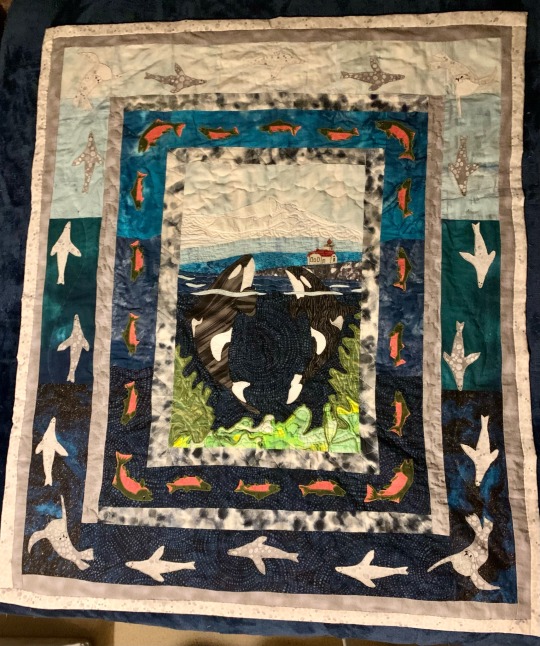
I am beyond words. I am absolutely fucking FLOORED by this quilt my amazing sister @a-myriad-of-stars made as a wedding gift for my wife and I. Look at those orcas! So distinctly Tilikum (left) and Tokitae (right)💜 Lime Kiln lighthouse and Kama Kulshan (Mt Baker) in the background, perfectly recognizable. Can you BELIEVE this was her first time making a quilt?!?!!
I can’t thank you enough sis. This is the best gift EVER! Love youuuuu
#orca#Tilikum#Tokitae#quilting#not my art#so cool!!!!#it’s so amazing I’m gonna cryyyyy#love you sis 💜💜💜#she made my wife and I into both seals and salmon!!!!
101 notes
·
View notes
Text
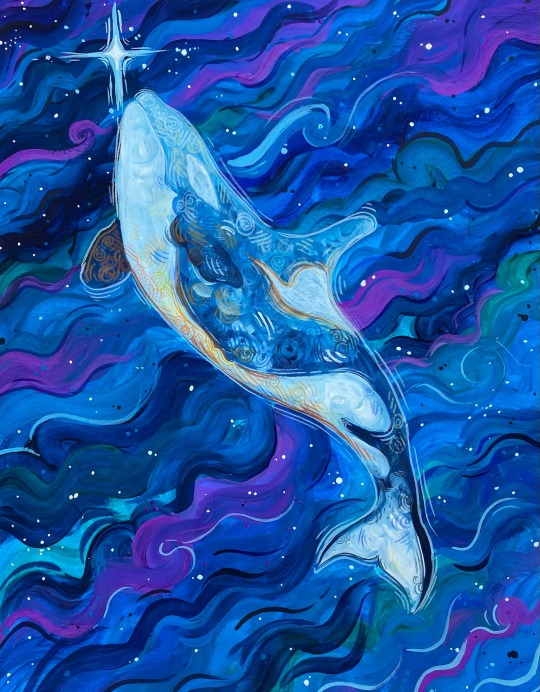
In loving memory of Tokitae ❤️
75 notes
·
View notes
Note
Thank you for your kind words about care takers & vet staff in the wake of Toki's passing. I've been on her support staff for several years, and the influx of vitriol and hate we've been receiving has been devastating on top of everything we're already going through. So, I wanted to thank you, because it's been rare to see support, or pretty much anything kind to us, recently. It made me smile 🩵
Of course, Anon 🫂 I’m so sorry for everything you’ve had to put up with, both from the outside and from your own management. You loved her, and unlike everyone else, you truly knew her. And you wanted what was best, even if it was unpopular. Thinking about you and your coworkers! 🐳
As for the angry folks showing up in my notes… why exactly do you think it’s okay to be so hateful toward the people who actually took care of Toki, who knew her in a way you and I never will? Why do you blame her care staff and vet team for something they had absolutely nothing to do with? Did you get a four-year degree in psychology or marine biology and complete multiple unpaid animal care internships, only to make minimum wage and get called an animal abuser online? Or did you go to school for eight years, not counting thousands of hours of additional education in exotic species you didn’t learn about during that schooling, just so you could make a quarter of what other doctors make and be told you’re in it for the money?
You really think you’re her advocate here?
43 notes
·
View notes
Text
"I first met Tokitae (also known as Toki, Lolita and Sk’aliCh’elh-tenaut), a female orca who had been captured off the coast of Washington, in 1987. I was a biology graduate student at my first professional conference, and the scientific society hosting this event held the opening reception at the Seaquarium.
Toki was 20 feet long and 7,000 pounds, and should have been in the Salish Sea traveling 40 miles a day and diving 500 feet deep with her mother and siblings. Yet there we were, a few hundred marine mammal scientists who mostly did field research, watching this magnificent being perform silly tricks in a bathtub.
That’s not really an exaggeration in Toki’s case. Toki’s tank was the smallest enclosure in the world for her species. It was only 35 feet at its widest point and 80 feet long. It was 20 feet at its deepest; if Toki hung vertically in the water, her tail flukes touched bottom. Captured in 1970 when she was 4 or 5 years old, she lived in this tiny space for 53 years.
The federal Animal Welfare Act (AWA), administered by the US Department of Agriculture, has a ludicrous requirement for tank width — only twice the length of an average adult orca (or 48 feet). But Toki’s tank didn’t even meet that weak standard. For years, the USDA offered various excuses for not taking steps to revoke the exhibitor’s license. None of them made sense, as the tank was plainly not to code. Activists repeatedly tried to sue the USDA for failing to enforce the law, without success.
Toki’s was a strange, lonely life. Despite many campaigns to repatriate her to her family (the L pod in Puget Sound), years passed. The stadium around her slowly and literally crumbled.
The ‘Blackfish’ Effect,” named after the 2013 documentary that eventually reached tens of millions of people globally, has shifted the captive cetacean paradigm in the past decade. Businesses have severed ties with marine theme parks, and policymakers have passed laws ending the commercial display of orcas and other cetacean species. SeaWorld, the company that built its brand on Shamu, is phasing out orca display — no longer capturing, breeding or trading them.
And still Toki languished in the South Florida heat. The Seaquarium’s two owners during Toki’s first 52 years there were adamant that she would never leave the park and disdainfully dismissed talk of returning her to her family.
In March 2022, however, Toki’s outlook finally seemed brighter. The Seaquarium was sold to a company whose business model relied primarily on swim-with-dolphin encounters. An orca didn’t fit that model, and these owners were willing to let her go. Efforts could finally begin in earnest to return her home. The Lummi Tribe, who gave her the name Sk’aliCh’elh-tenaut and considered her a relative, had prepared detailed plans for a seaside sanctuary in the Salish Sea.
Then, last month, Toki died. The hope felt by so many that she would finally go home disappeared in an instant.
Captivity robs orcas of a true life in the deep open sea. It robs them of family, of purpose, of change and challenge. Captivity is tremendous monotony for these socially complex, wide-ranging, intelligent animals. We should not perpetuate that.
Zoos and aquariums long ago relegated dancing bears and tricycle-riding chimps to circuses, but still claim that cetacean shows — loud extravaganzas featuring leaping orcas and cavorting dolphins — are educational (they are not). The industry could and should invest in seaside sanctuaries — it’s a win-win choice, as the industry would be heroes and the animals’ welfare would improve.
Let Toki’s miserable, isolated life and sad death mean something for her fellow captives. These amazing beings should not have to die to finally be free."
Dr. Naomi Rose is senior scientist (marine mammal biology) for the Animal Welfare Institute in Washington, D.C.
47 notes
·
View notes
Text
People really romanticize sea pens and “farm sanctuaries” and it blows my mind honestly
38 notes
·
View notes
Text
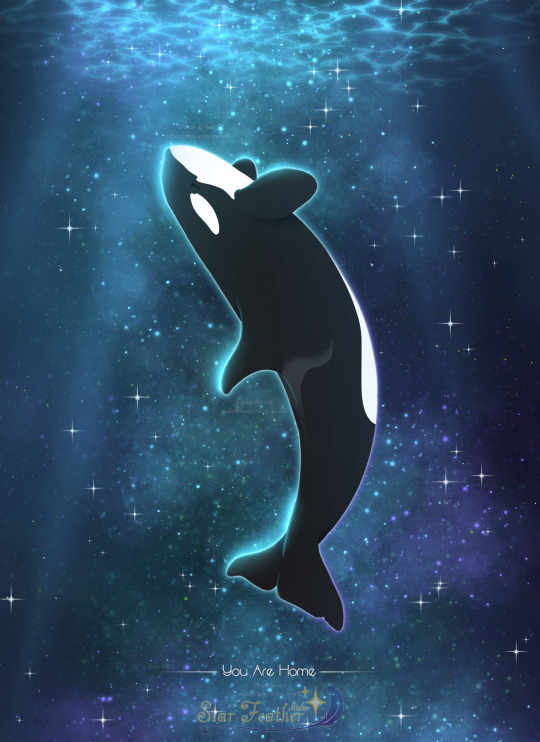
A Farewell to Tokitae
#tokitae#miami seaquarium#orca#I've honestly been really torn up about her death#she was really special to me in some ways
41 notes
·
View notes
Text
I don’t think I can adequately put into words the grief of watching the fight of three generations- 50 years of struggle and prayers- for our beloved sea-cousin’s return home crash and burn only feet from the finish line.
She was almost here. She was nearly home. She could have died in the waters of her ancestors, where her mother swims and her cousins are born and live and die. 50 years of fighting to bring her back and this time, just this once, we thought we’d won. Tokitae was coming back to us, where she belonged.
And the thing is, I never expected that for Tillikum. Or for Kasatka, or Corky, or Kiska, or for any of the others really. But Toki? The end was in sight and a lifetime of prayers built up in me and I positively burned with hope. I wanted so so so badly for her to make it back home, no matter how short it would be for her after. I wanted so so so badly for her not to die in that awful place.
Tokitae, I am so sorry for how we failed you. I am sorry for how much we’ve failed in this regard overall…
Every time I touch the shores of the Salish Sea I will whisper your name, so your ancestral waters remember you. Tomorrow night I will wade into the cold waters of the cove and run my fingers through the bioluminescence and I will tell the currents that you have gone ahead of us to the happy hunting grounds, where you are free and can grow fat with plenty of salmon. You’ll be with the matriarchs who have gone before; tell Polaris that I still think of her all the time, and she inspires me to keep fighting. I will tell the currents to carry that message to your mother, Ocean Sun, so that she knows you’ll be waiting for her.
Goodbye Tokitae. May the Mother welcome you home.
70 notes
·
View notes
Text

This is literal misinformation
#there was no planning. no permits.#‘moments’#and she was never going to be released#a sea pen is not release#rip beautiful lady#I’m sorry for everything#orcas#killer whales#tokitae#miami seaquarium
22 notes
·
View notes
Text
Tokitae passes away before her release
Tokitae , also known as Lolita, has passed away at the age of 57. Captured at the age of 4, she was the second eldest orca in captivity at Miami Seaquarium.
In March 2023 it was announced that she was to be returned to the waters of her birth. She was to reside in a semi - wild sea pen in the Salish Sea for the rest of her life.
Tragically it was announced on August 18 that Tokitae had passed away at the Seaquarium due to renal failure after exhibiting sights of distress for 2 days.
Statistics:
Currently there are 54 orcas in captivity worldwide, 29 of whom were captive-born. There are 17 orcas in the SeaWorld parks.
At least 176 orcas have died in captivity across the world, and 30 orca calves have either been miscarried or stillborn.
In the wild, male orcas can live for 40 to 60 years and females 80 to 90.
Sources: Wikipedia, The New York Times and NBC.
ADDENDUM
Another tradgedy 43 years earlier - Tokitae’s cellmate
In 1968 Hugo was the first orca at Miami Seaquarium.
When Tokitae arrived he had been in a tank on his own for 2 years.
They shared the tank for 10 years until Hugo died of a brain aneurysm in 1980. It was caused by repeatedly and violently ramming his head into the sides of his tank.
He was 15 years old.
Tokitae spent the rest of her life alone in the tank or with a few dolphins for company.
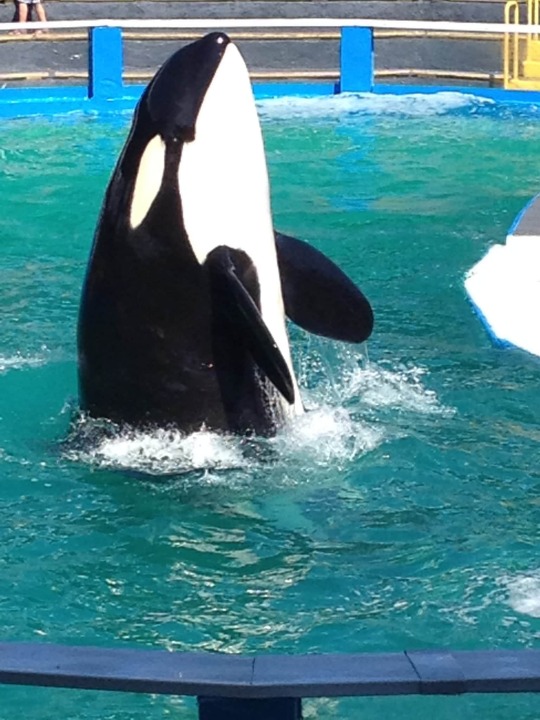
29 notes
·
View notes
Text
“Toki was an inspiration to all who had the fortune to hear her story and especially to the Lummi nation that considered her family.”
…weren’t the Lummi on the forefront of the fight to free her?
The Miami Seaquarium daring to even mention an Indigenous nation whose sacred animal they have kidnapped, abused, neglected, and let die in a tiny concrete tank is perhaps the most laughably disturbing part of this whole charade. It stinks of performative allyship and it stinks of racism.
It just stinks.
#this hit me like a truck when I read those words and I could not believe#the sheer audacity#animal rights#cetaceans#tokitae#anti captivity#empty the tanks
15 notes
·
View notes
Text
Please, please tell me there are reasonable people in this world who realize that Corky’s situation is nothing like Tokitae’s. Please tell me they aren’t serious about wanting to recreate the trauma she endured as a youngster by taking her away from her family a second time.
And please, tell me SeaWorld will protect her.
Don’t let them take her.
#leave corky alone#she’s already in the best place she could be#with her adoptive family#seaworld#corky#corky ii#tokitae#orcas#killer whales
50 notes
·
View notes
Text
This is the picture of her being "set free" finally out of the tank I'm going to explode I'm so sad
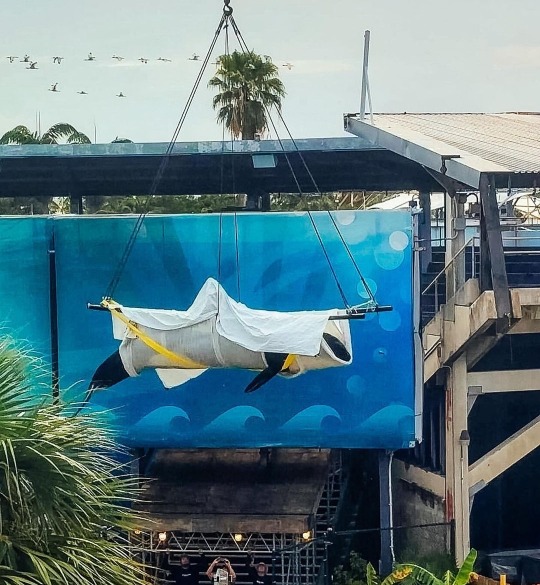
#and what are they gonna do with her body?????#landfill. perhaps turn her into dog food. no celebration of her life whatsoever just dump her away#tokitae
17 notes
·
View notes
Text
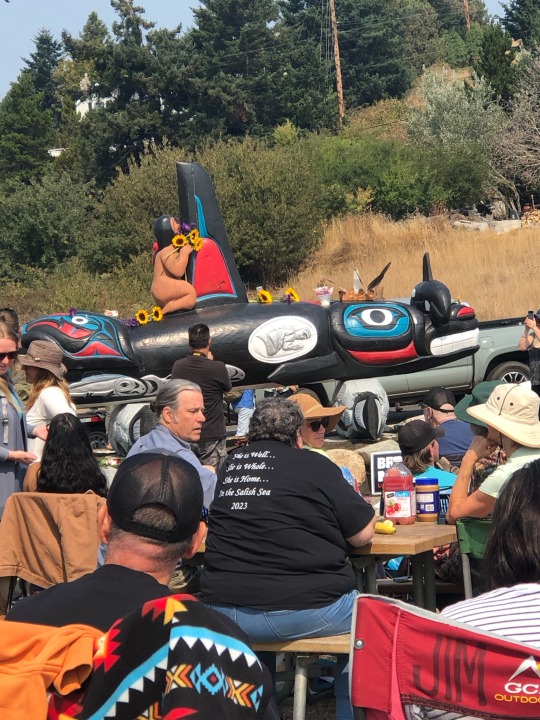
The celebration of life for Tokitae and the installation ceremony for this story pole on San Juan island was really lovely today. It’s always good to hear the Lummi people speak and share their amazing leadership and wisdom, and to hear for sure that Sk’aliCh’elh’tenaut’s body will be coming home.
Going to really try to follow the wisdom the Lummi elders shared today about moving beyond our grief of this loss to focus our energy on protecting and preserving the rest of Toki’s family, who still need our help. The dead baby orcas draped over the story pole’s nose represents the baby that the J-pod orca, Tahlequah, carried on a tour of grief for 17 days. Her message was clear then as it is now: we need help. Our babies are starving, and we are dying. Help us, please, help us.
Remember that no extinction happens in a vacuum. We need to protect the salmon, and the water, and the orcas. They share a future with our next 7 generations. What world will we leave for them?
(Imagine description in alt)
#Tokitae#sk’ali ch’ehl’ tenaut#southern resident killer whales#SRKWs#southern resident orcas#orcas#marine science#marine mammals#Lummi nation
49 notes
·
View notes
Text
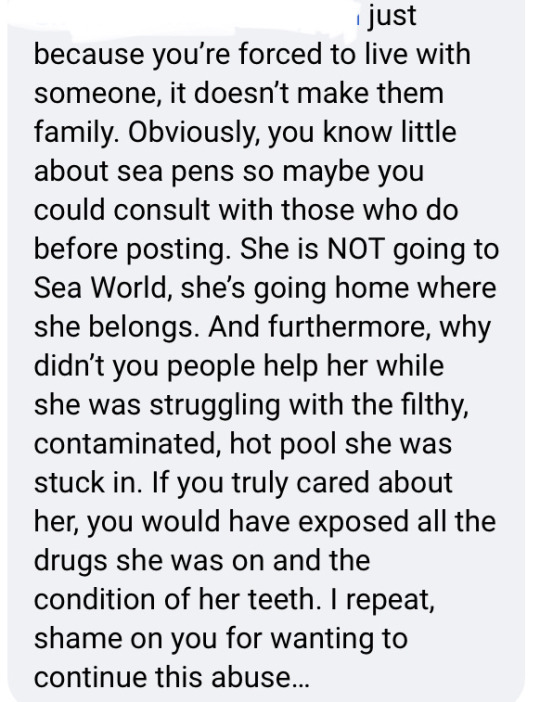

The best part? All of this was directed at one of Toki’s trainers.
(I don’t want to defend her pool, it’s atrocious, but it actually is chilled to the same temp as SeaWorld’s orca habitats. And contrary to popular belief, algae growth is a sign of healthy water and also helps reduce glare. Aquariums remove it only because it looks “dirty” to guests).
(Also… her teeth? Are beautiful? The best teeth of any geriatric orca in human care hands down. This lady doesn’t even know what whale she’s talking about).
#tokitae#the ric o’barry comment SENT ME#yeah the guy who’s been charged with violating the marine mammal protection act#the guy who KEEPS releasing non-releasable dolphins (like… dolphins with prosthetics. I’m not joking).#that guy. he’ll teach you.#orcas#killer whales#miami seaquarium
16 notes
·
View notes